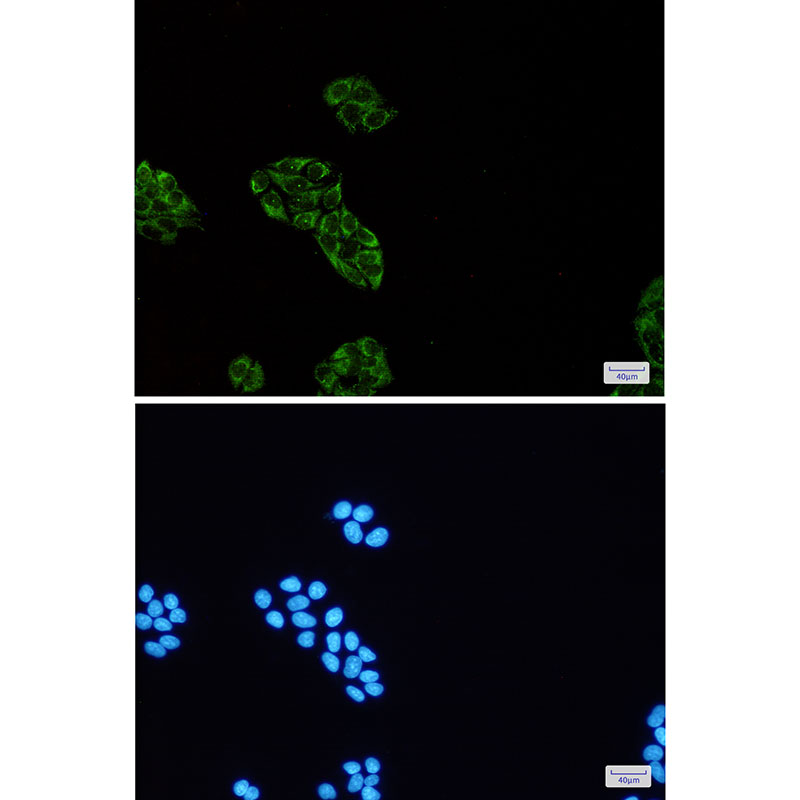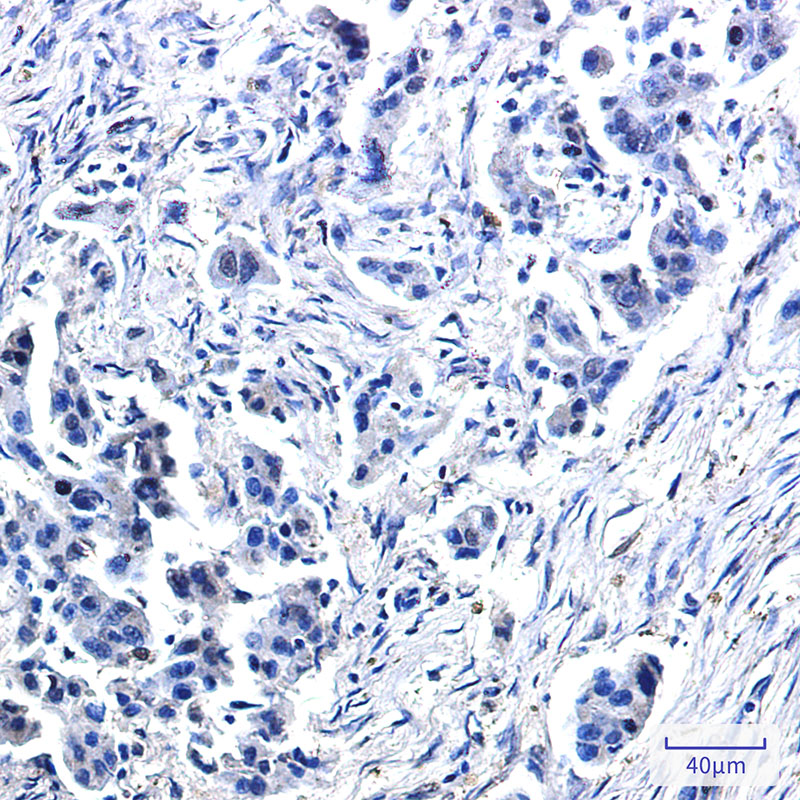


| WB | 1/500-1/1000 | Human,Mouse,Rat |
| IF | 1/20 | Human,Mouse,Rat |
| IHC | 1/50-1/100 | Human,Mouse,Rat |
| ICC | 1/50-1/200 | Human,Mouse,Rat |
| FCM | 咨询技术 | Human,Mouse,Rat |
| Elisa | 咨询技术 | Human,Mouse,Rat |
| Aliases | Deubiquitinating enzyme 10; UBPO; USP10 |
| Entrez GeneID | 9100 |
| WB Predicted band size | Calculated MW: 87 kDa; Observed MW: 110 kDa |
| Host/Isotype | Rabbit IgG |
| Antibody Type | Primary antibody |
| Storage | Store at 4°C short term. Aliquot and store at -20°C long term. Avoid freeze/thaw cycles. |
| Species Reactivity | Human |
| Immunogen | A synthetic peptide of human USP10 |
| Formulation | Purified antibody in TBS with 0.05% sodium azide,0.05%BSA and 50% glycerol. |
+ +
以下是3-4条关于USP10抗体的参考文献及其简要摘要:
---
1. **文献名称**:*USP10 regulates p53 localization and stability by deubiquitinating p53*
**作者**:Yuan J, et al.
**摘要**:该研究揭示了USP10通过去泛素化作用稳定肿瘤抑制蛋白p53.并调控其在细胞核与细胞质之间的转运。实验中使用USP10抗体验证了USP10与p53的相互作用及其在DNA损伤应答中的功能。
---
2. **文献名称**:*USP10 antagonizes c-Myc transcriptional activation through SIRT6 stabilization to suppress tumor formation*
**作者**:Lin Z, et al.
**摘要**:研究发现USP10通过去泛素化稳定SIRT6.抑制c-Myc介导的肿瘤发生。研究利用USP10抗体进行免疫共沉淀(Co-IP)和染色质免疫沉淀(ChIP),揭示了其在表观遗传调控中的关键作用。
---
3. **文献名称**:*USP10 modulates autophagy via deubiquitinating and stabilizing Beclin-1*
**作者**:Saito T, et al.
**摘要**:该文献证明USP10通过去泛素化自噬相关蛋白Beclin-1促进自噬活性,并依赖其去泛素酶功能。研究通过USP10抗体敲低实验,证实了其在细胞应激条件下对自噬通路的调控。
---
4. **文献名称**:*Ubiquitin-specific protease 10 (USP10) inhibits hepatitis B virus replication through restoring lysine 48-linked ubiquitination of HBx*
**作者**:Wang Y, et al.
**摘要**:研究显示USP10通过调控乙型肝炎病毒(HBV)蛋白HBx的泛素化修饰抑制病毒复制。实验中采用USP10抗体进行免疫荧光和Western blot分析,明确了其在抗病毒天然免疫中的作用。
---
以上文献涵盖了USP10在肿瘤抑制、自噬调控、抗病毒机制等领域的功能研究,均涉及USP10抗体的实验应用(如Western blot、免疫沉淀等)。
The ubiquitin-specific protease 10 (USP10) is a deubiquitinating enzyme that regulates protein stability and function by removing ubiquitin chains from target proteins. It plays critical roles in diverse cellular processes, including DNA damage response, apoptosis, autophagy, and tumor suppression. USP10 is notably involved in stabilizing key tumor suppressors like p53 and PTEN by counteracting their proteasomal degradation. Dysregulation of USP10 has been linked to cancers, neurodegenerative diseases, and viral infections, making it a subject of interest in therapeutic research.
Antibodies targeting USP10 are essential tools for studying its expression, localization, and molecular interactions. These antibodies are widely used in techniques such as Western blotting, immunohistochemistry, and immunoprecipitation to investigate USP10's roles in health and disease. For instance, studies using USP10 antibodies have revealed its cytoplasmic-nuclear shuttling dynamics and context-dependent functions in stress responses. Researchers also utilize these antibodies to explore USP10's interplay with viral proteins or its modulation by post-translational modifications. Validation of USP10 antibodies often involves siRNA knockdown or knockout controls to confirm specificity, as cross-reactivity with homologous USPs remains a potential challenge. The development of high-affinity, isoform-specific USP10 antibodies continues to advance mechanistic studies and biomarker discovery in cancer and other pathologies.
×